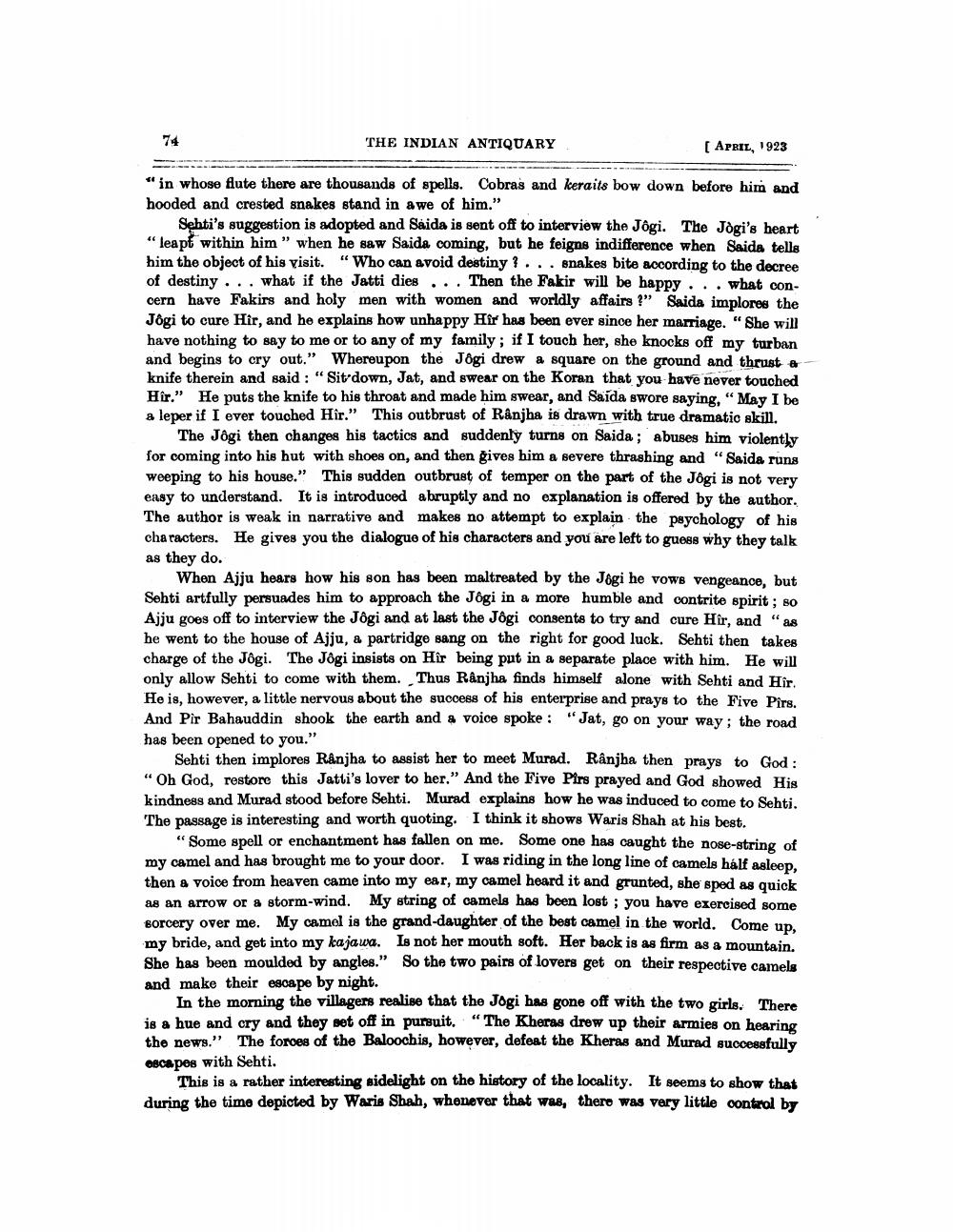________________
74
THE INDIAN ANTIQUARY
[ APRIL, 923
"in whose flute there are thousands of spells. Cobras and keraits bow down before him and hooded and crested snakes stand in awe of him."
Sehti's suggestion is adopted and Saida is sent off to interview the Jõgi. The Jogi's heart "leapt within him " when he saw Saida coming, but he feigns indifference when Saida tells him the object of his visit. "Who can avoid destiny ? ... snakes bite according to the decree of destiny ... what if the Jatti dies ... Then the Fakir will be happy . . . what concern have Fakirs and holy men with women and worldly affairs ?" Saida implores the Jogi to cure Hir, and he explains how unhappy Hîr has been ever since her marriage." She will have nothing to say to me or to any of my family; if I touch her, she knocks off my turban and begins to cry out." Whereupon the Jõgi drew a square on the ground and thrust a knife therein and said : "Sitdown, Jat, and swear on the Koran that you have never touched Hir." He puts the knife to his throat and made him swear, and Saida swore saying, “May I be a leper if I ever touched Hîr." This outbrust of Ranjha is drawn with true dramatic skill.
The Jõgi then changes his tactics and suddenly turns on Saida; abuses him violently for coming into his hut with shoes on, and then gives him a severe thrashing and "Saida runs weeping to his house." This sudden outbrust of temper on the part of the Jôgi is not very easy to understand. It is introduced abruptly and no explanation is offered by the author. The author is weak in narrative and makes no attempt to explain the psychology of his characters. He gives you the dialogue of his characters and you are left to guess why they talk as they do.
When Ajju hears how his son has been maltreated by the Jogi he vows vengeance, but Sehti artfully persuades him to approach the Jogi in a more humble and contrite spirit ; so Ajju goes off to interview the Jõgi and at last the Jogi consents to try and cure Hîr, and "as he went to the house of Ajju, a partridge sang on the right for good luck. Sehti then takes charge of the Jõgi. The Jogi insists on Hir being put in a separate place with him. He will only allow Sehti to come with them. Thus Ranjha finds himself alone with Sehti and Hir. He is, however, a little nervous about the success of his enterprise and prays to the Five Pirs. And Pir Bahauddin shook the earth and a voice spoke : "Jat, go on your way; the road has been opened to you."
Sehti then implores Ranjha to assist her to meet Murad. Ranjha then prays to God : "Oh God, restore this Jatti's lover to her.” And the Five Pirs prayed and God showed His kindness and Murad stood before Sehti. Murad explains how he was induced to come to Sehti. The passage is interesting and worth quoting. I think it shows Waris Shah at his best.
«Some spell or enchantment has fallen on me. Some one has caught the nose-string of my camel and has brought me to your door. I was riding in the long line of camels hálf asleep. then a voice from heaven came into my ear, my camel heard it and grunted, she sped as quick as an arrow or a storm-wind. My string of camels has been lost ; you have exercised some sorcery over me. My camel is the grand-daughter of the best camel in the world. Come up, my bride, and get into my kajawa. Is not her mouth soft. Her back is as firm as a mountain. She has been moulded by angles." So the two pairs of lovers get on their respective camels and make their escape by night.
In the morning the villagers realise that the Jogi has gone off with the two girls. There is a hue and cry and they set off in pursuit. "The Kheras drew up their armies on hearing the new. The forces of the Baloochis, however, defeat the Kheras and Murad successfully oscapes with Sehti.
This is a rather interesting sidelight on the history of the locality. It seems to show that during the time depicted by Waris Shah, whenever that was, there was very little control by




